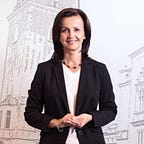Managing man and machine in Central and Eastern Europe
The publication of PwC’s 20th CEO Survey has given me an opportunity to look back over the past 20 years of economic, political and social transformation in Central and Eastern Europe. The changes during that time have been profound, often painful but ultimately hugely beneficial for the region’s people and its companies. There’s little doubt about it: CEE is one of the regions of the world that’s been a clear winner from globalisation and technological progress.
Don’t believe me?
Stop for a moment, and think back to what your business and your daily life were like 20 years ago. How did you get to work every day? How did you communicate with distant colleagues? When you took your earnings to the bank, what was that experience like?
Regional business leaders’ appreciation for the benefits of globalisation is seen clearly in the survey results. When we asked business leaders how much globalisation has helped in various areas, the percentage who responded “to a large extent” was higher than the global average in 11 of the 12 areas. CEOs in Central and Eastern Europe are much more likely than their global peers to see globalisation as a force for good in areas including upholding access to infrastructure and basic services, improving the ease of moving capital, people, goods and information and harmonising regulations.
We also need to bear in mind that while technology speeds up and improves the gathering and analysis of data, judgment about what to do with the results of that analysis is a function that can only be provided by humans.
But while the region’s business leaders appreciate the benefits we’ve gained from globalisation and new technologies, they also recognise a number of challenges on the horizon.
One of those is rapid change in the skill sets businesses need, as technological advances automate certain tasks while creating demand for new ones. We also need to bear in mind that while technology speeds up and improves the gathering and analysis of data, judgment about what to do with the results of that analysis is a function that can only be provided by humans.
Both of these developments can be seen in the world of drone-powered solutions, a brand-new practice area for PwC that’s based in the Warsaw office. Remotely piloted vehicles can be used to gather geographical data, monitor construction work and perform inspections of equipment in difficult-to-reach locations. That’s pushing down the value of the ability to strap on a safety harness, climb up an antenna mast and inspect equipment. But it’s also creating new positions for people who are capable of operating (and maintaining) drones, and interpreting what the vehicles’ cameras tell them.
Like their global peers, business leaders in our region are looking inside their companies for growth, rather than at acquisitions or joint ventures: asked which element of their business they most want to strengthen, the largest group identified innovation.
That’s music to my ears; I’ve long been an advocate of building a better ecosystem for innovation in this region. As the region’s advantage on labour costs is steadily eroded, competing on our ability to do new things, and do old things better, will be the key to continued success.
Central and Eastern Europe has a long, proud tradition of technical education, and CEE is a popular destination for multinationals to outsource R&D. Where the region still needs to improve is in converting all that knowledge into homegrown companies.
At the moment, we have all the pieces of the puzzle: academia, research, a vibrant startup scene and established businesses. What’s missing is the integration of all of these elements. Smart CEOs (and other leaders) will look for ways to build up trust among the various elements of the ecosystem, allowing them to work together effectively.
If we get that right, just imagine what our region could look like in another twenty years’ time.
